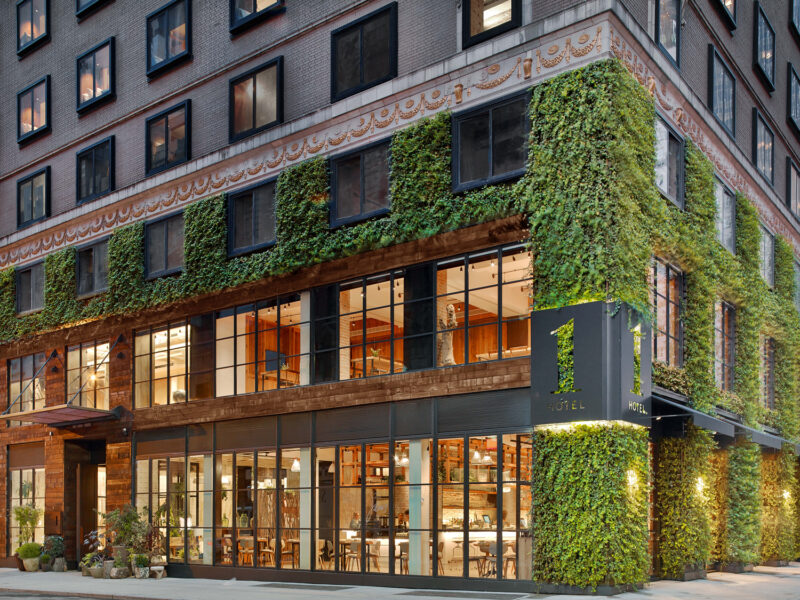

In the book “Sustainable Travel,” author Holly Tuppen asks, “Is it morally acceptable to travel the world for fun while it burns up around us?”
Do I have to answer that? Travel and fun are my two favorite hobbies. I get a dopamine rush reading Lonely Planet books. A contact high just hearing about other people’s trips. I would give up anything before travel. Beef. Shopping. My first born (except of course for family vacations).
The irony is that the more I travel, the more I see the devastation caused by my hefty carbon footprint. Landing in places whose severe drought conditions have been brought on, in part, by my wanting to see them, is beginning to feel just plain weird.
For us travel junkies who aren’t ready to quit cold turkey, we can at least do it better. Once you’ve found a more fuel efficient way to get to your destination, (train, bus EV, or at the very least carbon offsetting your flight,) pick a more eco-friendly place to sleep.
There are so many hotels everywhere going green (and greenwashing), so you need to know what to look for. A lot of unscrupulous hotels are jumping on the sustainability bandwagon. Pepper the websites with little green leaf symbols and throw green paint on the lobby wall and ta-da! You’re “sustainable.”
Greenwashing can come in lighter shades of green. Building a bee hive on the roof of a hotel is all well and good (very good), but if that’s all a hotel is doing, it’s all just window dressing. If their only sustainability initiative is that the chef sources salad from a farmers market, that might be a red flag.
A hotel that’s genuinely going green is reducing waste, using sustainable materials and improving energy efficiency.
An eco-friendly hotel should be eliminating single-use plastics completely. Fifty percent of the plastic produced worldwide is single use, meaning those tiny barely-touched bottles of soaps, shampoo and conditioner break down into micro-plastics in our food and drinking water. Ditching them in favor of a refillable dispenser system in the shower saves a ton of plastic waste. If you find yourself at one of the last holdouts still offering mini toiletries, resist loading up on them just because they’re free.
Hotel restaurants don’t have to be “farm to table,” but they should try to emphasize organic, seasonal and locally sourced ingredients. Look for a restaurant that works with regional farmers, fishers, bakers and makers. This helps the local economy and reduces the environmental impact of shipping. At the bar, embrace the rise of biodynamic and organic wines and small-scale brewing.
The kitchen should be minimizing food waste by repurposing ingredients and composting leftovers. Some hotels have gotten rid of the huge, help-yourself buffet, because a big chunk of that food usually ends up in the trash.
To conserve water, a planet-friendly hotel will employ low-flow plumbing fixtures like filters in taps, sinks and showers. Smart showers with preset shower timers also help remind us to conserve water.
A lot of the less glamorous work eco-friendly hotels do to reduce CO2s emissions is happening behind the scenes, so look for a sustainable policy on a hotel’s website that spells out the specifics of how they’re reducing energy, carbon, water and food waste.
We don’t need to do loads of research ourselves if a hotel has a credible sustainability certification (i.e. not issued by the hotel industry). Look for a hotel with a certificate from an organization such as EarthCheck or Leadership for and Environmental Design (LEED) that flags the specific sustainability initiatives it has implemented and requires strict environmental standards.
Sustainability looks different depending on where you go. If a London hotel boasts about water conservation, think about that as you’re opening your umbrella for the umpteenth time that day. In places like the Southwest, where large-scale development has degraded the water supply, it’s worth considering whether building a new hotel with seven pools might be draining the local drinking supply.
While there are hotels everywhere doing good things, the poster child for eco-friendly digs is 1 Hotel in New York City. This urban sanctuary describes itself as “a mission-driven luxury hotel,” proving that luxury and sustainability don’t have to be mutually exclusive.
Stopping in last week, the crank in me wanted to call “greenwashing,” because it seemed too good to be true. When I read, “Take notice of your surroundings” on one of their wooden pencils, I had to suppress an eye roll. But then I thought, “Why not?” Just because the front door is adorned with found branches doesn’t mean they aren’t also doing the heavy lifting in terms of energy efficiency, waste and reducing plastic.
From the recycled wooden room keys to chalkboards that replace paper note pads, this hotel keeps finding creative ways to go greener. They provide a complimentary EV taxi service and let guests use their 100 percent electric Audi Q8 E-trons. With their “One Less Thing” program, they suggest that if you’ve overpacked and would like to give back, they’ll donate a clothing item to the nonprofit Housing Works. My favorite program is the Dark Sky Night they host in the lobby, where the lights are dimmed as a reminder that light pollution is detrimental to wildlife.
If you stay at a hotel that makes half this effort, they’re getting it right.
1 Hotel has sister hotels in 17 countries, but you can find eco-friendly hotels everywhere. In Paris, I like the charming Trianon Rive Gauche. London’s Tree House is also a top-notch establishment.
There’s an assumption that small, family run hotels are more sustainable than large corporate chains. Not necessarily.
Some of the world’s biggest hotel chains are taking measures to become more eco-conscious. With almost 6,000 locations, Marriott is the most sustainable option amongst large hotel chains (with the Hilton coming in as a close second). They’ve integrated numerous sustainable practices such as eliminating Styrofoam and switching to refillable bottles in their bathrooms. They’ve swapped out plastic for paper in everything from straws to wrappers.
No matter what changes hotels make or don’t make, a hotel is only as green as its guests. If your hotel room isn’t equipped with motion sensors, turn off lights when you leave the room. Ditto A/C. Whether or not they offer plastic water bottles, always bring your own refillable bottle.
Almost all hotels now encourage guests to “think about the environment” by declining to have their linens changed, which saves energy and water. We just need to do it. I want to believe that I don’t need to be bribed, but love that there’s a hotel in London that offers guests a free drink at the bar for opting out of having their room serviced. In Switzerland, another hotel offers 10 percent off a massage if you opt out.
Another easy way to be a greener guest is to simply speak up. Marriott ended its use of single-use plastic straws across all of its properties because of customer outcry. If you see a hotel doing something right, also say something. Hotels are like small children — praise encourages good behavior.
By the time I walked out of 1 Hotel, a bright, shiny organic apple in hand, the scent of eucalyptus candles having thoroughly infused my clothes, my old image of planet friendly hippie digs had shifted. I began to think that traveling sustainably was just what fabulously cool people did.
And maybe today that’s the truth.
Find a Greener Hotel:
Green Pearls (greenpearls.com): A small selection of mostly luxury hotels across the globe.
Green Globe (greenglobe.com): Measures travel and tourism businesses and their supply chains and contains 44 core criteria. Smaller selection of hotels that skews slightly more rural.
Green Key Global (greenkey.global): 1,600 certified hotels, mostly in the United States. Uses a grading system with five keys being the highest and provides guidance on improving a rating.
Trip Zero (tripzero.com): U.S. based hotel booking website calculates the carbon impact of your trip to the hotel you book, and offsets the carbon footprint at no cost to you.
 More Posts from Jenny Noble
More Posts from Jenny Noble